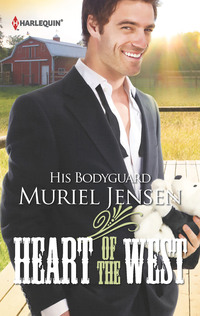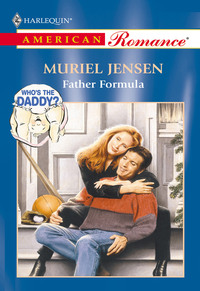
Полная версия
Milky Way

WELCOME TO TYLER-TRY SOME CHEESECAKE
Britt Hansen’s started a new line of dairy products and it’s selling like crazy! Pull up a chair and savor the triumphs—and tragedies—of America’s favorite hometown.
A YOUNG WIDOW STRUGGLES TO SAVE FAMILY FARM
Britt is certain that her new venture will save her farm from bankruptcy—if she can convince the dairy, her biggest creditor, to give her the time she needs.
WILL THE DAIRY REP STAND IN HER WAY?
Jake Marshack’s future at the dairy will be assured if he can persuade Britt to sell her farm. But he hadn’t expected the mother of four to be so determined...or so attractive. Soon, he isn’t sure if their battle is one he wants to win....
Previously Published.
“I won’t sell this farm,” Britt said.
“Mrs. Hansen, you’re in considerable debt already, with little chance of fighting your way out. If you sell, you can pay all your debts and still have enough left over to start four college funds.”
She did not appear appeased. “You even know how many children I have.”
“Details are an important part of my job,” he said without apology. “You owe us a lot of money, Mrs. Hansen. One of us better do his research.”
She marched across the kitchen, yanked the door open and fixed him with a lethal stare. “I’m a 34B, I love silk underthings, mocha fudge ice cream, and I root for the Milwaukee Brewers. Anything else you’d like to know?”
Temporarily defeated, Jake smiled politely and went to the door. “We’ll deliver your supplies,” he said as he stepped out, “as soon as your bill is paid.”
Dear Reader,
Welcome to Mills & Boon’s Tyler, a small Wisconsin town whose citizens we hope you’ll soon come to know and love. Like many of the innovative publishing concepts Mills & Boon has launched over the years, the idea for the Tyler series originated in response to our readers’ preferences. Your enthusiasm for sequels and continuing characters within many of the Mills & Boon lines has prompted us to create a twelve-book series of individual romances whose characters’ lives inevitably intertwine.
Tyler faces many challenges typical of small towns, but the fabric of this fictional community created by Mills & Boon will be torn by the revelation of a long-ago murder, the details of which will evolve right through the series. This intriguing crime will culminate in an emotional trial that profoundly affects the lives of the Ingallses, the Barons, the Forresters and the Wochecks.
A hot baseball game is going on across the park, and, as usual, the whole town is turning out for the Fourth of July picnic. No doubt they’ll be sampling Britt Hansen’s delicious new yogurt products.
And there’s startling scuttlebutt, as well. The investigation of Margaret Ingalls’s death takes a dramatic turn. In fact, it seems Alyssa Baron is preparing to take over the family business. Judson just hasn’t been the same since the news.…
So join us in Tyler for a slice of small-town life that’s not as innocent or as quiet as you might expect, and for a sense of community that will capture your mind and your heart.
Marsha Zinberg
Editorial Coordinator, Tyler
Milky Way
Muriel Jensen

MILLS & BOON
Before you start reading, why not sign up?
Thank you for downloading this Mills & Boon book. If you want to hear about exclusive discounts, special offers and competitions, sign up to our email newsletter today!
SIGN ME UP!
Or simply visit
signup.millsandboon.co.uk
Mills & Boon emails are completely free to receive and you can unsubscribe at any time via the link in any email we send you.
To Joe and Sally Rohne,
who have a beautiful farm, and a beautiful romance
Special thanks and acknowledgment to Muriel Jensen for her contribution to the TYLER series.
Special thanks and acknowledgment to Joanna Kosloff for her contribution to the concept for the TYLER series.
CONTENTS
Cover
Back Cover Text
Dear Reader
Title Page
Dedication
Acknowledgments
Chapter One
Chapter Two
Chapter Three
Chapter Four
Chapter Five
Chapter Six
Chapter Seven
Chapter Eight
Chapter Nine
Chapter Ten
Chapter Eleven
Chapter Twelve
Chapter Thirteen
Chapter Fourteen
Chapter Fifteen
Chapter Sixteen
Chapter Seventeen
Copyright
CHAPTER ONE
JAKE MARSHACK TURNED his red Ford Explorer off the highway onto the gravel side road marked with the Wisconsin Department of Transportation’s official brown-and-yellow Rustic Road designation. The signs identified stretches of thoroughfare that retained the charm of days gone by, when life and travel were slower, when there’d been time to smell the wildflowers and listen to the birds. But the rich, verdant pasture spreading out to his left, dotted with grazing Holsteins, and the tall, lush green crowding in on his right went unnoticed. He didn’t see the gray clouds against the stormy spring sky, heralding rain, or the fat black-and-white Canada geese flying toward Timber Lake, a quarter of a mile away. His mind was ticking over figures.
As Winnebago Dairy’s sales manager in southeastern Wisconsin, Jake spent most of his time in a Chicago office. But several times a year he went on the road to collect outstanding receivables. He could be charming and firm, understanding but unshakable in his resolve to have the district with the best numbers. Still, the percentage of uncollectible debt was growing among the smaller farms in his district, and the struggles of their owners to hold on to what little they had left touched him as few things in life did.
But business was business. However much he hated this part of his job, he had to do it. When the big red barn and the white Victorian farmhouse beyond it came into view, he pulled over to review his notes.
“Hansen widow trying hard, but still unable to pay,” Buckley, the sales rep, had reported after his last call at Lakeside Farm. “Renting out large parcels of pasture in March and promises to pay outstanding balance at that time.”
Jake checked his printout. March had come and gone and there’d been no payment. In fact, there’d been no payment since the previous September. Policy was clear. The widow Hansen was cut off pending payment in full.
Jake closed his folder with a groan. Great. A widow. He had to stop feed delivery to some little old arthritic thing who’d probably lose the farm before the year was out and be forced to move in with one of her kids.
He shook his head as he pulled back onto the road and headed for the lane to the house. He’d never understand why generation after generation of farmers broke their backs and very often their hearts over a piece of land that was subject to every joke God, nature and the government could play. It was masochistic and senseless. He couldn’t imagine dedicating one’s life to something as completely unpredictable as a harvest.
Now, numbers made sense. Columns that balanced were easy to understand. A future that depended solely on what an individual could do was the only course worth plotting, as far as he was concerned. Needing and depending on others or on the beneficence of nature always led to a predictable end—disappointment.
Jake didn’t believe in disappointment. He believed in success.
He pulled to a stop behind a muddy blue GMC truck at the side of the house. A yellow Lab lying at the top of the porch steps raised an intelligent face to watch him. Jake leaped out of the vehicle, careful to miss a puddle, and took a moment to look around.
The house had a peaked roof with gingerbread finials and a wraparound porch. It was tidy but in need of a fresh coat of paint. A heart-shaped wreath of dried flowers hung on the front door, and scarlet May-blooming tulips and bright forget-menots trimmed the foundation and the porch steps. He imagined the little widow kneeling on a rug and pampering her flowers.
Maybe he’d get lucky, he thought, and she wouldn’t be home. He could send her a registered letter telling her she was customer non grata. No. He had the best numbers in the company because he dealt with people face-to-face. He made things turn out his way, but he did it openly.
He took two steps up toward the porch and was greeted by a hair-raising growl from deep in the Lab’s throat and a clear view of impressive canine incisors. The dog hadn’t moved, and Jake got the distinct impression it was because she didn’t feel she had to.
Accustomed to a fair amount of hostility, Jake had perfected an understanding manner and a conciliatory tone of voice that usually worked on dogs as well as people. He extended a cautious hand and asked, “Good dog?”
The Lab changed demeanor instantly. Rolling onto her back, she tucked her feet in in eager surrender, her strong tail wagging madly. She whined in helpless adoration as Jake reached up to scratch her sturdy mound of a chest. An upside-down tongue flicked at the sleeve of Jake’s suit jacket.
Jake laughed. “You are a good dog,” he praised. “You’re not much of a security system, but I’ll bet you’re a great friend.”
The dog rolled onto four big feet and followed him as he went to the front door and knocked. She sat on his right foot as he waited...and waited.
* * *
BRITTANY HANSEN STOOD on tiptoe on top of an eight-foot wooden ladder and groped for the shingle that was just beyond her reach. She growled impatiently when the tip of her longest finger refused to close the gap.
“Come on!” she said aloud. “One more shingle! I am not going to climb down and move the ladder again for one more shingle!”
She withdrew her aching arm and studied the shingle with hostility. Rubbing her aching biceps, she tried to remember why repairing the hole in the porch roof had seemed so important this afternoon. Because she wanted to put the porch swing out, she reminded herself, and a large drip had developed where she usually placed it near the kitchen window.
And because Jimmy had always brought the old swing out for her at the first sign of spring, and she wanted to prove to herself that although he wasn’t here to do it, it would still get done.
Sneaky, strong emotion rose up to sting her eyes and clog her throat. Having it out would be no fun, and she’d probably choke up every time she looked at it, but it would be in its place because she had put it there. It would be one small victory after a long dark winter of silent, corrosive grief.
Britt drew a deep breath, leaned her weight against the roof and stretched her right hand out as far as she could reach—and felt the toe of her right foot push the ladder out from under her.
She screamed, the palms of her hands scraping over the rough tiles as she slid down, then caught the rain gutter with her fingers.
Great, she thought with a gallows humor she was surprised to find had survived the winter. Hanging by my fingernails. Literally. The bank should see this.
She groped with her feet for the porch railing, but the extended roof had her too far out to reach.
She considered letting go, but the drop to the ground was considerable. She could not afford a broken limb at this point in time, and the way her luck had been running, a multiple fracture was bound to result.
“Dammit, Jimmy!” she shouted at the air. “Do something!”
* * *
JAKE AND THE LAB, still waiting at the front door were galvanized into action by a crash followed immediately by a piercing screech. With one loud Woof! the dog ran around the porch to the back of the house. Jake followed, his mind already in sympathy with the poor little arthritic old lady.
He jerked to a halt at the sight of a pair of long legs dangling at eye level. They were not arthritic legs. They were slender, shapely legs in snug denim. His brain took a moment to swap mental images and assimilate what was happening.
His eyes lifted to a baggy gray sweater and arms holding rigidly, desperately to the gutter. Pale blue eyes in a white face were wide with alarm and a curious resignation.
Jake wrapped an arm around a pillar to steady himself and reached out over the railing.
* * *
BRITT STARED at the man in the three-piece gray suit and wondered if her desperation had conjured him up. Before she could decide, he had a fistful of the front of her sweater.
“Kick a leg out toward me,” he ordered.
She blinked. He didn’t disappear. “Who are you?” she asked.
She heard his gasp of exasperation. “Does that matter at the moment? Kick a leg out.”
Reflexively, she complied, and felt a muscular arm wrap itself around it.
“Now drop a hand to my shoulder.”
She wanted to, but even the threat of falling couldn’t blunt the effect of a large male hand wrapped high around her inner thigh.
“I haven’t got a good grip on you,” he said when she hesitated. “If you fall now, we’re both going over. I don’t know about you, but weeks of traction wouldn’t fit into my schedule.”
“I...can’t hold on with one hand.”
“When you let that hand go, I’ll have you.”
“You’re sure?”
“Absolutely.”
She believed him. She wasn’t sure why. Possibly because she wasn’t in a position not to. Closing her eyes, she dropped a hand and reached out blindly. She uttered a little scream as her other hand lost purchase and she fell, landing solidly against hard muscle. Sitting on his arm, she was swung sideways over the railing, then deposited on her feet.
For an instant she couldn’t breathe or speak. All she could do was stare.
Her Good Samaritan was long-legged and lean, with just enough thickness in the shoulder to make her grateful he’d been the one to come along and not spindly Chuck Stuart, who rented part of her pasture.
With eyes the color of maple wood and dark blond hair side-parted and perfectly groomed, he bore a startling resemblance to Kevin Costner. His recent exertion hadn’t disturbed his good looks at all. There was a confident, capable air about him that was comforting and alarming.
She watched him shrug his coat back into place and straighten his tie.
She began to emerge from her trance when she noticed the subtle elegance of everything about him. His finely tailored suit probably cost more than her monthly food budget. And he wore cuff links—gold and jade, if she wasn’t mistaken. Antiques, probably. His shoes were shined to perfection.
She pulled herself together and folded her arms. “You’re from the bank,” she accused.
“No,” he said.
“An attorney, then.”
“No.”
She frowned, her shoulders relaxing. “Then who are you?” Jake had never seen hair that color. It rioted around her face in soft curls and ended in a fat braid that rested on her shoulder. It was the shade of a ripe peach, a sort of pink-orange with gold highlights. He judged by the generous spattering of freckles on her face that the color was natural.
Aware that he hadn’t answered her question, he offered his hand and a smile he was sure had to be at least a little vague. “Jake Marshack,” he said. “And you are...?”
She studied him uncertainly for a moment, then shook his hand. Her fingers were long and slender, but her grip was firm. “Britt Hansen. Thank you for rescuing me.”
He indulged in a poignant memory of an armful of soft, round hip, then immediately dismissed it. “The...widow Hansen?” he asked.
She laughed lightly at the title. “One and the same. For a minute I thought you were the villain come to tie me to the railroad tracks. Instead you turn out to be a genuine Dudley Doright. Come on inside. A gallant rescue deserves at least a cup of coffee.”
She beckoned the dog with a slap to her thigh. “Come on, Daffy.”
Jake hesitated on the threshold as she opened the back door. Dudley Doright he was not. “Mrs. Hansen...”
But the ring of a telephone at the far end of the kitchen made her hurry inside. She gestured for him to follow and pointed to a chair at a large round table. The dog settled under it.
Feeling an annoying little niggle of guilt, he sat. He’d left his notebook in the car because he’d found that official papers and copies of bills always made people defensive, and he wanted them willing to work with him. Of course, in her case, he doubted she had anything to work with.
Chatting happily to someone he judged by the conversation to be a neighbor, she washed her hands, poured coffee into two mugs, then walked the full extension of the phone cord to hand one to him. He stood and reached across the table for it.
“No, I was happy to lend it to you, Judy,” she was saying, “but if you’re finished with it, I’ll come pick it up. I was trying to repair the porch roof with my short ladder and almost broke my neck!”
She grinned at him, and he heard a loud expression of dismay from the other end of the connection.
“No, no, I’m fine. Dudley Doright rescued me.”
“Who?” came across the line loud and clear.
“It’s a long story. I’ll tell you about it when I pick up the ladder. I’m going to town tomorrow—want me to bring you anything?”
While she made notes on a pad stuck to the refrigerator, Jake sipped his coffee and studied the enormous kitchen. It was a large square room papered in a soft blue-and-cream pattern. The woodwork was Williamsburg blue and the high cupboards were oak. Children’s artwork and schedules covered the beige refrigerator, and something with a rich, beefy fragrance simmered in a deep pot on the stove.
The table at which he sat was bordered on two sides by sparkling countertops. The third wall was painted creamy white and covered with what appeared to be antique kitchen implements and an ancient pitchfork that must have been hand-carved all of a piece. He was wondering who had used it how long ago when three kittens, one white and two spotted black-and-white, suddenly ran across the kitchen from the room beyond. They tumbled over one another in a rolling heap, then raced back the way they’d come.
He had turned his attention to the pitchfork again when the widow Hansen joined him at the table.
Pale blue eyes smiled at him over the rim of her cup. “My great-grandmother pitched hay with that,” she said, “and once held an amorous neighbor at bay while my great-grandfather was off hunting. I believe her father carved it. Would you like something to go with your coffee?”
“Ah...no, thank you.” He straightened in his chair. It was time to state his business. “Actually, I’m from Winnebago Dairy. I’m here to talk to you about...” He looked into her eyes and experienced a glitch in his thought processes. His brain disengaged and he couldn’t remember simple words. All that seemed to work were his eyes, which couldn’t stop looking into hers.
They were like Lake Geneva under a cloudy sky, softly gray-blue and suggesting unimagined depths. He felt pulled in, like a diver who’d forgotten to draw a breath before jumping.
“About?” she prompted. She lowered her cup and a subtle change took place in her cheerful, friendly expression. That helped him pull himself together.
“About your bill.” He forced out the words and groped for his professional persona. “You’re eight months overdue, Mrs. Hansen.”
She looked at him levelly across the table, her eyes now like the lake in February—with a six-foot, impenetrable ice crust. “So you’re not Dudley Doright, after all,” she said, pushing away from the table.
Jake half expected her to order him to leave. Instead, she went to the sink, a deep old porcelain one with ancient faucets, around which a more modern counter and cupboards had been built. She looked out the window, and he supposed she could see the cows grazing.
“You’re here to cut me off,” she guessed.
He mentally went through all his options. It didn’t take long. There weren’t any. “I’m afraid so,” he said finally. He added, “The moment you pay the outstanding balance, I’ll send a truck out with the order you put in two days ago.”
She turned and leaned against the edge of the sink, both hands behind her, gripping it. “I can’t pay right now, but I’ve been to the bank about a loan. I should have an answer in a few days. And I’m getting a desserts business going on the side for extra money. I—”
“Our rep,” he interrupted quietly, “said you thought you’d be able to pay when you rented out pasture.”
She nodded. “It went to the mortgage. I thought having my payments almost current would give me a better shot at getting a loan.”
Robbing Peter to pay Paul was a sign of real trouble. But Jake knew that was how half his customers made it from year to year.
He shook his head regretfully. “I’m sorry. We’ll ship to you the moment—”
“But I could have the money for you in a week,” she said, trying desperately to keep the plea out of her voice. She wanted to convey competence, reasonableness.
“Or the bank could turn you down,” he said gently.
She tilted her chin. “I believe they’ll approve me.”
Jake stood. If he had to hurt her feelings, he felt he had to do it on his feet. “I’ve seen your credit file, Mrs. Hansen. I think you’re deluding yourself.”
Anger sparked in her eyes, which were suddenly like the lake in an electrical storm. “At the moment, hope is all I have, Mr....” She hesitated over his name.
“Marshack,” he provided.
“Marshack,” she repeated. “If you’re going to tie me to the train track, let me at least hold on to the hope that the real Dudley will come along.”
Jake wanted out of the warm, cozy kitchen and out from under her judgmental glare more than he wanted anything else at that moment. Yet something rooted him in place. He guessed the reason was that she looked so touchingly brave that he couldn’t do anything cowardly.
So he decided to tell her what he thought. “Mrs. Hansen, small farms run by strong men are going under left and right. Why continue to fight the inevitable? We’ve offered to buy you out twice. Maybe it’s time you considered it.”
She was now rigid with anger, but he gave her credit for controlling it very well. Had their roles been reversed, he’d have had her on the porch by now, on the business end of the pitchfork.
“This is a heritage farm,” she said, her voice very quiet. “It’s been in my family for four generations—five, counting my children. I’m not interested in turning it over to a dairy that now owns more of Wisconsin and Illinois than the state park systems.”
He nodded. “I’ve been empowered to raise the offer.” He named the sum Stan Foreman, vice president of sales, had brought to his office that morning with the subtle reminder that acquiring her property for the company would speed Jake’s rise up the corporate ladder. The offer was generous and was intended to knock her off her feet and out of her stubbornly negative stance. It didn’t.
For an instant the blue eyes widened and he saw a flash of longing, then it was gone and he was treated once again to the February lake. “You don’t understand,” she said, her patience obviously strained. “Four generations of Bauers were born here. It’s been like a gift passed from hand to hand. I couldn’t sell this farm any more than I could sell one of my children.”









